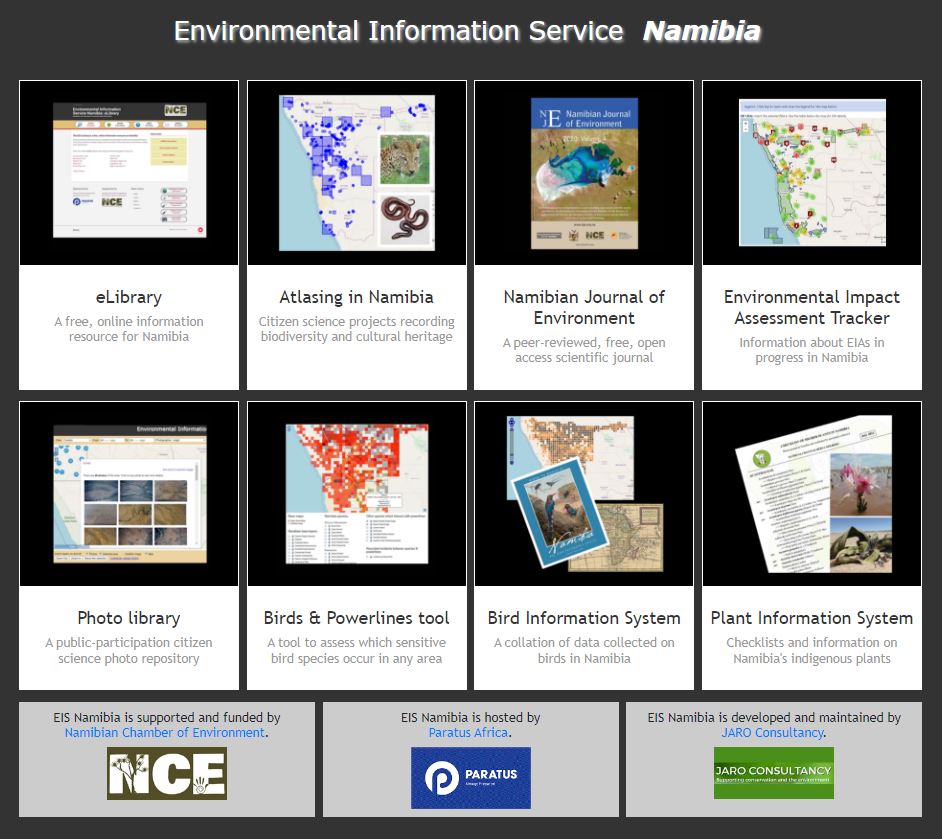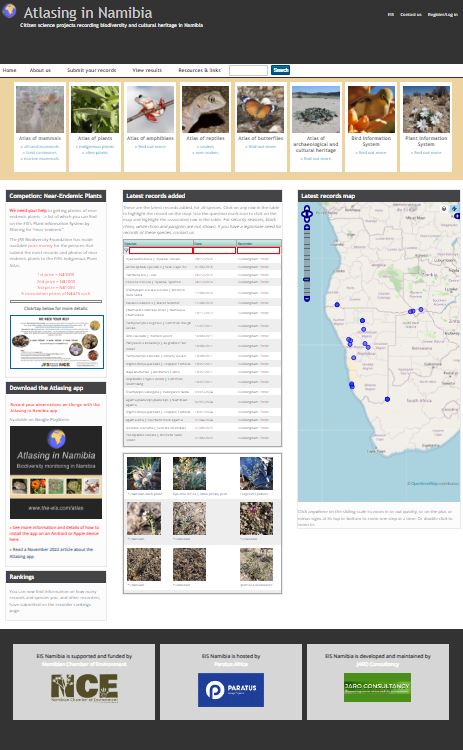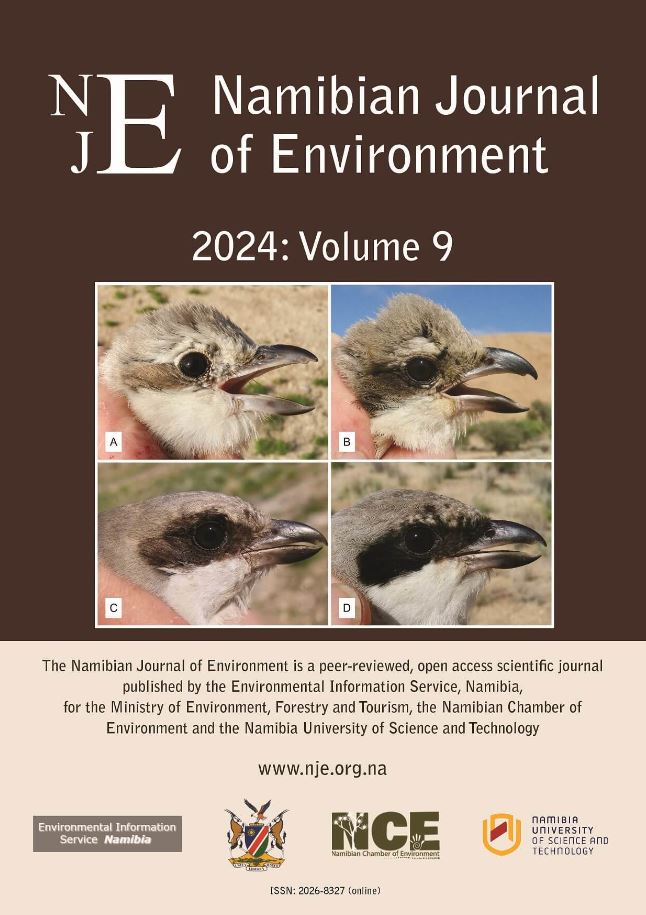Organise conferences, symposia and workshops on topical environmental issues and on research themes, and facilitate Member’s positions on international negotiations, treaties and conservation priorities.
+264 (0)81 162 5807 | +264 (0)83 726 5200
gro.e-c-nobfsctd-8685bf@nimda

The main purpose of the NCE is to support its Members to achieve the Aspirational Objectives, to fill gaps, and to promote sound environmental management in Namibia. The NCE does not compete with its Members, neither in the area of project implementation nor in the area of fund raising. In this context, the NCE wishes to respond to the collective requirements of its Members, both in how best it could provide support to the Membership, and also how the NCE and its collective Membership should prioritise work to enhance conservation and sustainable development in Namibia.
The Objectives are implemented through eight strategic programme areas.
A Membership policy, based on the NCE Constitution, was developed and approved by ExCom. It sets out the application process and establishes two types of membership – Full Members (Namibian registered non-governmental environmental organisations) and Associate Members (non-Namibian non-governmental environmental organisations and individuals). Only Full Members have voting rights. All other rights are the same.
The NCE provides facilities for particularly field-based Members when in Windhoek – workspace, internet, boardroom for meetings, safe off-street parking.
The NCE has entered into a MoU with Westair to make available a Cessna 182 to NCE and Members at the cost of the fuel only. Welwitschia Insurance Brokers have donated the insurance costs and Westair carries all other costs. They also source experienced pilots. A booking system is being set up and will be run by Henriette. The aircraft will be branded to reflect its environmental work.
The NCE has engaged Today Namibia to broaden the social media platform of the NCE, its Members and key environmental themes. Today Namibia will post up to three messages per week, feature Members stories and activities, announce events, promote campaigns, etc.
The NCE is in discussions with Venture Publications to rebrand “Conservation and the Environment in Namibia” as a Venture-NCE product – specifically for NCE members to publish popular information on their projects, activities and organisation. The idea is that about half of the annual publication would focus on a theme, e.g. recent “Animal movements and satellite tracking” workshop results from late 2016, while the other half would be available to members to tell their stories.
This programme area looks at organising conferences, symposia and workshops on topical and relevant environmental issues, on research themes and facilitating Member’s positions on issues of conservation priority.
In October 2016, a successful symposium on “Animals movements and satellite tracking” was organised at the Otjikoto EE Centre, attended by some 25 organisations, including from Botswana, South Africa and Scotland. The proceedings are available on the Environmental Information Service (the EIS).
In June 2017, a workshop will be held for the Environmental Departments of all mines in Namibia to develop a 3-year environmental strategy and action plan for the mining sector. We see this extending to the development of a “Good Practice Guide for mining in Namibia” and a set of environmental criteria for inclusion of the mining sector into the Eco Awards Namibia programme.
Early in the 4th quarter of 2017 a conference will be held on “The State of Namibia’s Environment”. This will be a joint initiative between the Sustainable Development Advisory Council (SDAC), NCE and MEFT.
The Sustainable Development Goals (SDGs) were reviewed, all material not relevant to Namibia removed, and then circulated to all Members. NUST used this as a theme for a recent workshop and a number of Members have marked in where their work contributes to the achievement of goals. This is then shared with NPC (national focal point) and UNDP (national support agency).
A campaign is being run to reduce the amount of plastics in the environment, with the focus on one-off use plastic items such as plastic bags and disposable drinks bottles. This work is being done in partnership with Miss Earth Namibia 2016 and her Plastics Campaign, the Parliamentary Standing Committee on Natural Resources Management, The Dogg (musician), Superspar, Plastics Packaging Namibia, Recycling Namibia and MEFT.
This programme area engages with governments and other authorities on policy and legislative issues, and aspects of concern for Namibia’s environment and sustainable development.
The NCE issued several Statements and Open Letters, including the following:
The NCE is also working with MEFT on environmental legislation, e.g. EMA and Parks & Wildlife Bill.
There is currently a vacuum in this field in Namibia. An Environmental Policy Research Forum was established, with SAIEA (Peter Tarr) as chairperson, and comprising some NCE Members and representatives from GRN and the business community. Their first task focussed on prioritising thematic areas. The top two were (i) urban environment & development, and (ii) business / corporate Namibia and environment.
The NCE assisted with the establishment of an NGO focusing on the urban environment – Development Workshop Namibia, and provided it with a small catalytic grant of N$80,000 plus funds to hire interns. This work attracted support from GiZ and more recently from the Finnish Embassy, resulting in a significant initiative on urban development, housing, access to land and related developments.
Work on the business / corporate sector and the environment is planned to start in June 2017, with the arrival of a professor in environmental audit and students from Germany, linking up with NUST students, funded by GiZ. The focus will be on impacts on ecosystem services, including carbon footprints, leading to the design of a larger policy research initiative, with the intention of producing a “Good Practice Guide for corporate Namibia”.
The Environmental Information Service (EIS) comprises a searchable e-library with downloadable publications, reports, data sets, maps, legislation, theses, presentations, etc; a citizen science atlasing platform with mammal, carnivore, snake, frog and invasive alien plant atlas projects ongoing, new atlases about to be added and an Atlasing app for mobile data collection; a landscape photographic component to help assess landscape changes over time; a scientific on-line e-journal, Namibian Journal of Environment and, most recently, the EIA Tracker, an online tool to promote transparency, public input and understanding of the EIA process in Namibia.

The Environmental Information Service of Namibia (The EIS) is a searchable e-library with downloadable publications, reports, data sets, maps, legislation, theses, presentations and more.
A lot of information exists which is currently not easily accessible. This includes literature, reports, GIS data and other environmental information. Often, finding out what information exists and then obtaining it is a long and time-consuming process.
The EIS brings together data and information from a wide range of sources with a user-friendly search interface. Once you have searched for the information you require you can then download it for free, if it is available.
Anyone with internet access can use the EIS. It is of value to researchers, students, NGOs, government staff and more, both within Namibia and further afield.

Namibia’s citizen science portal, Atlasing in Namibia builds on previous atlasing projects such as the Southern African Bird Atlas Project (SABAP) and the Tree Atlas Project (TAP).
Data sets collected through public participation are a valuable way to learn more about the distribution of species. You can submit data from sightings, photographs, camera traps, telemetry, spoor and any other records.
There is an associated app which enables submission of records in the field. The Atlasing in Namibia app is the official app of the Atlasing in Namibia website (www.the-eis.com/atlas), part of Namibia’s Environmental Information Service (www.the-eis.com).
» Download the app from Google PlayStore (Android)
» Download the app through this link (iOS)
Full information on the app, its use, download instructions and more are provided on the app page of the Atlasing in Namibia website.

Launched in December 2017, the Namibian Journal of Environment is a peer-reviewed, free, open access scientific journal published by the Environmental Information Service, Namibia, for the Ministry of Environment, Forestry and Tourism, the Namibian Chamber of Environment and the Namibia University of Science and Technology.
The NJE accepts papers containing information about any aspect of the environment in Namibia. This includes areas of ecology, agriculture, social sciences, economics, policy and law, water and energy, climate change, planning, land use, pollution, strategic and environmental assessment and related fields. It publishes primary research findings, syntheses and reviews, applied and theoretical research, field observations and the testing of hypotheses, new ideas and the exchange of opinions, and book reviews.
The NJE publishes four categories of articles:
An Internship programme is linked to the Environmental Policy Research work. Currently two interns are working under the guidance of Development Workshop Namibia. An additional two interns are working on MSc degrees at NUST out of NCE offices on wildlife census work and cavity breeding. And most recently, a PhD student has started at NCE on a human-wildlife conflict study in conservancies, together with NACSO and NUST.
A Trust Deed has been drawn up to source funding from the professionals in Namibia for bursaries to people working in the environmental sector. The focus is mainly on post-graduate studies. The Trust Deed is currently being registered with the Master of the High Court, and the main objective is to get it registered as a welfare organisation so that donations are tax deductible.
The core running costs of the NCE are currently being covered by B2Gold Namibia. This means that all contributions from other donors go directly into the grants line and into Member’s projects.
B2Gold Namibia is assisting with fund raising amongst corporates. This focuses on two aspects: (i) making direct grants to the NCE and (ii) using the NCE to select, and facilitate the development of, good environmental projects for the deployment of the environmental component of their Corporate Social Responsibility (CSR) funds.
The Green Climate Fund (GCF) is the largest environmental fund in the world. Currently in Namibia, only the Environmental Investment Fund (EIF) is accredited, and there is limited access to Namibia’s NGOs. The NCE has therefore provided some seed funding to the NNF to prepare for accreditation with the GCF, on behalf of the NCE Membership. A small amount of funding is also being made available to facilitate bringing the sector together to plan appropriate projects for submission to the GCF.
Objectives of the Fund
What does NCEF seek to do?